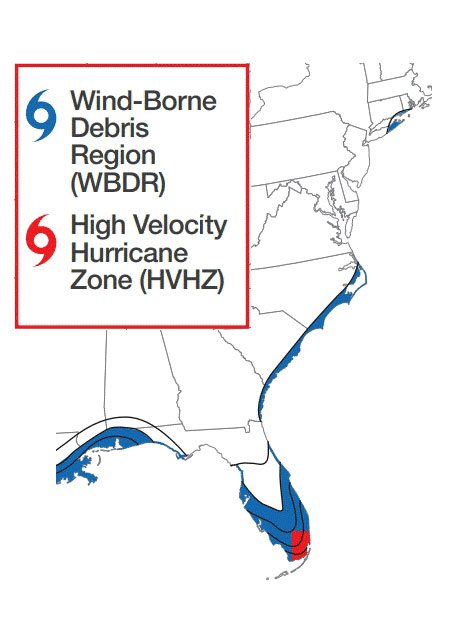
If you need assistance please call us at: (561) 422-4935
High-Velocity Hurricane Zones (HVHZ)
In South Florida, the areas designated as High-Velocity Hurricane Zones (HVHZ) primarily include Miami-Dade and Broward Counties. These zones are specifically defined in the Florida Building Code due to their high risk of experiencing strong hurricanes. The designation HVHZ indicates that buildings and homes in these areas are subject to more stringent building requirements, particularly concerning wind resistance and impact protection for windows and doors. This is to ensure that structures can better withstand the intense wind speeds and associated flying debris typical of major hurricanes.
The designation of High-Velocity Hurricane Zones (HVHZ) in Florida is primarily controlled by the Florida Building Commission, which is responsible for setting and updating the Florida Building Code. This includes the specific regulations and requirements for HVHZ areas. The Florida Building Code incorporates findings from hurricane studies and damage assessments to define which areas are classified as HVHZ, reflecting the regions most at risk for severe windstorms and hurricanes.
In South Florida, the areas designated as High-Velocity Hurricane Zones (HVHZ) primarily include Miami-Dade and Broward Counties. These zones are specifically defined in the Florida Building Code due to their high risk of experiencing strong hurricanes. The designation HVHZ indicates that buildings and homes in these areas are subject to more stringent building requirements, particularly concerning wind resistance and impact protection for windows and doors. This is to ensure that structures can better withstand the intense wind speeds and associated flying debris typical of major hurricanes.
Additionally, input and recommendations can come from local governments, engineering studies, and historical data regarding hurricane impacts in Florida. These contributions help inform revisions and updates to the Building Code, ensuring that it remains responsive to evolving understanding of hurricane behavior and risk patterns in the state.
Living in High-Velocity Hurricane Zones (HVHZ) in Florida necessitates several additional precautions and considerations to ensure safety and minimize property damage during severe weather events. Besides upgrading to impact windows and doors, here are other important measures:
Roof Reinforcement:
Strengthening the roof structure is crucial, as roofs often bear the brunt of hurricane winds. This can include using hurricane straps or clips to secure the roof to the walls, selecting roofing materials rated for higher wind resistance, and ensuring proper sealing and anchoring of roof coverings.Garage Doors:
Upgrading to reinforced garage doors that can withstand high winds is important because if a garage door fails, it can increase the risk of structural damage to the entire home.Flood Barriers:
Installing flood barriers or using sandbags can help prevent water from entering the home during storm surges and heavy rain. Elevating electrical systems and appliances above potential flood levels is also advisable.Landscaping and Yard Maintenance:
Properly maintaining the yard to ensure that trees are trimmed and loose items are secured can reduce the risk of debris becoming projectiles during a storm. Choosing native and hurricane-resistant plants and trees can also help.Emergency Preparedness Kit
Keeping an emergency kit ready with essentials such as water, non-perishable food, medications, flashlights, batteries, and first aid supplies is vital. It's also wise to include important documents in a waterproof container.Evacuation Plan:
Knowing the local evacuation routes and having a clear plan in place is critical in HVHZ. This includes understanding when and how to evacuate if advised by local authorities.Insurance Review:
Regularly reviewing property insurance to ensure adequate coverage for both wind damage and flooding is essential. Homeowner's insurance in HVHZ typically requires a separate windstorm policy and often flood insurance as well.Backup Power:
Investing in a generator or alternative power sources can be critical for maintaining electricity during and after a hurricane, especially for powering essential appliances and medical equipment.Building and Zoning Compliance:
Ensuring that all home improvements and constructions comply with local building codes and zoning regulations, which are designed to enhance safety and reduce damage in hurricane-prone areas. By addressing these various aspects, residents in HVHZ can better prepare their homes and families for the high-impact conditions typical of severe hurricanes, thus enhancing their resilience against such extreme weather events.
Fill out the form below or call (561) 422-4935 to receive your free in-home estimate.